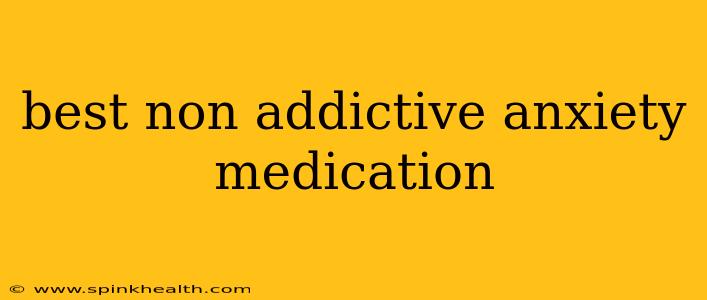Anxiety. That persistent feeling of unease, the knot in your stomach, the racing heart. Millions grapple with it daily, seeking relief and a path back to tranquility. The search for the "best" non-addictive anxiety medication is a common one, fueled by a desire for relief without the potential pitfalls of dependence. This journey isn't always straightforward, but understanding the options and the nuances of each can pave the way towards finding the right solution for you. Remember, this information is for educational purposes only and should not replace consultation with a healthcare professional.
What are the different types of non-addictive anxiety medications?
This is a crucial question, and the answer lies in understanding that "non-addictive" is a relative term. While some medications carry a significantly lower risk of dependence than others, it's crucial to work closely with a doctor to find the right fit for your specific needs and to monitor for any potential side effects. Generally, the following categories are considered to have lower risks of addiction compared to benzodiazepines:
1. Buspirone (Buspar):
This medication works differently than many other anxiety medications. It doesn't act as a sedative and doesn't directly impact GABA receptors (like benzodiazepines). It takes several weeks to reach full effectiveness, working more on the long-term management of anxiety rather than providing immediate relief. It’s often chosen because of its lower risk of dependence.
2. Certain Antidepressants:
Several antidepressants, particularly those classified as Selective Serotonin Reuptake Inhibitors (SSRIs) and Serotonin-Norepinephrine Reuptake Inhibitors (SNRIs), can be effective in treating anxiety. Examples include:
- SSRIs: Sertraline (Zoloft), Escitalopram (Lexapro), Fluoxetine (Prozac), Paroxetine (Paxil), Citalopram (Celexa)
- SNRIs: Venlafaxine (Effexor), Duloxetine (Cymbalta)
These medications work by adjusting the levels of neurotransmitters in the brain that impact mood and anxiety. They are generally considered relatively safe and less prone to addiction compared to benzodiazepines, but side effects vary and are important to consider.
3. Beta-blockers:
While not specifically designed for anxiety, beta-blockers can be helpful in managing the physical symptoms of anxiety, such as a racing heart, trembling, and sweating. They work by blocking the effects of adrenaline, reducing these physical manifestations. However, they don't address the underlying psychological aspects of anxiety.
What are the side effects of non-addictive anxiety medications?
Every medication has the potential for side effects. It's crucial to discuss these with your doctor to weigh the benefits against the risks. Possible side effects can vary based on the individual and the medication:
- Buspirone: Dizziness, nausea, headache, drowsiness
- SSRIs/SNRIs: Nausea, headache, drowsiness, sexual dysfunction, weight changes
- Beta-blockers: Dizziness, fatigue, low blood pressure, bradycardia (slow heart rate)
What are some alternative treatments for anxiety besides medication?
Medication is not the only avenue for managing anxiety. Many find significant relief through complementary therapies:
Therapy (Cognitive Behavioral Therapy or CBT):
CBT is a highly effective therapy that helps individuals identify and change negative thought patterns and behaviors that contribute to anxiety.
Lifestyle changes:
Regular exercise, a balanced diet, mindfulness techniques (meditation, yoga), and sufficient sleep can all significantly impact anxiety levels.
How can I find the right non-addictive anxiety medication for me?
Finding the right medication is a collaborative process. It requires open communication with your doctor or psychiatrist. They'll take your medical history, assess your symptoms, and help you determine the most appropriate course of action. This may involve trial and error to find the medication and dosage that works best for you while minimizing potential side effects.
What if non-addictive medications don't work for me?
If the initially chosen medications prove ineffective, your doctor can explore other options, potentially including a combination of medications or adjustments in dosage. It's vital to maintain open communication and adjust the treatment plan as needed.
This journey towards managing anxiety is personal. There is no one-size-fits-all solution. The path to calmness involves understanding your options, working with a healthcare professional, and implementing strategies that support your overall well-being. Remember, seeking help is a sign of strength, and finding the right path to managing your anxiety is achievable with patience and persistence.

